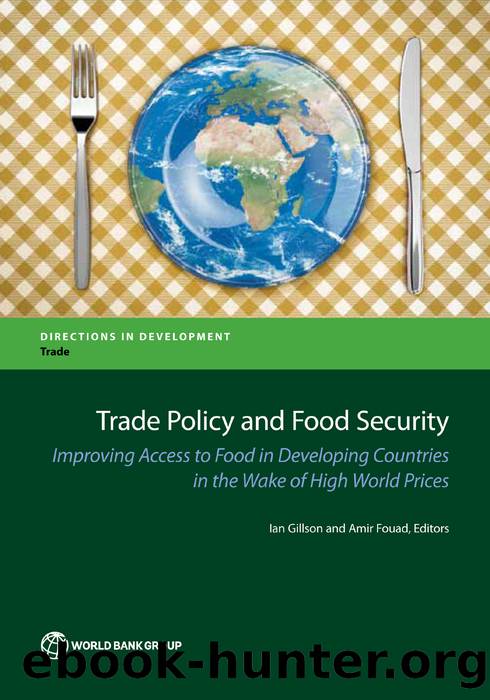Trade Policy and Food Security: Improving Access to Food in Developing Countries in the Wake of High World Prices by Ian Gillson Amir Fouad

Author:Ian Gillson, Amir Fouad
Language: eng
Format: epub
Publisher: The World Bank
Conclusion
Trade is a part of food security. Even critics, such as Professor de Schutter, acknowledge this point, although they would like to see its role reduced to complement a quest for greater self-reliance. Most see a better disciplined, more open trading system as a critical variable in the food security equation, in that it helps improve both resource allocation, and hence the ability to purchase food, and transmission of food to where it is needed. These factors give the WTO, as the guardian of the multilateral trading system, an important role in achieving food security.
The WTOâs Agreement on Agriculture was an important step in improving the international trading conditions for agriculture. But more needs to be done to level the playing field for tradeâand investmentâin agriculture; disciplines need to be strengthened and market access improved, both to allow those with a comparative advantage in agriculture greater scope to use that advantage and to facilitate importation by those who need food. The elements for the next step are on the table, in the form of the draft modalities for agriculture in the context of the Doha Round.
The modalities are just thatâa step forward. Important issues would remain, including improved disciplines on export restrictions. But overall, improvements would be significant: access would be enhanced, disciplines strengthened, and flexibilities retained for countries to implement their chosen food security policies. In the context of an agreed Doha Round, the advantages would multiply. Thus, for example, negotiators would also reach an agreement on trade facilitation, easing nontariff measures on the entry of imports, and renew emphasis on Aid for Trade, potentially improving infrastructures. In all, the environment for efficient resource allocation and growth would improve and, hence, the prospects for food security would be enhanced. This is too much to leave on the table, particularly with so many people hungry.
Download
This site does not store any files on its server. We only index and link to content provided by other sites. Please contact the content providers to delete copyright contents if any and email us, we'll remove relevant links or contents immediately.
Doing It: Let's Talk About Sex... by Hannah Witton(8558)
The 5 Love Languages: The Secret to Love That Lasts by Gary Chapman(8522)
Should I Stay or Should I Go? by Ramani Durvasula(6796)
The Road Less Traveled by M. Scott Peck(6646)
The Lost Art of Listening by Michael P. Nichols(6481)
Daring Greatly by Brene Brown(5648)
We Need to Talk by Celeste Headlee(4879)
Beartown by Fredrik Backman(4429)
Men In Love by Nancy Friday(4338)
The State of Affairs by Esther Perel(3941)
The Rules Do Not Apply by Ariel Levy(3912)
How To Win Friends and Influence People by Dale Carnegie(3778)
Reflections Of A Man by Mr. Amari Soul(3706)
The Ethical Slut by Janet W. Hardy(3509)
Algedonic by r.h. Sin(3507)
Pillow Thoughts by Courtney Peppernell(3411)
Finding My Forever by Heidi McLaughlin(3311)
He's Just Not That Into You by Greg Behrendt & Liz Tuccillo(3307)
I Love You But I Don't Trust You by Mira Kirshenbaum(3233)
